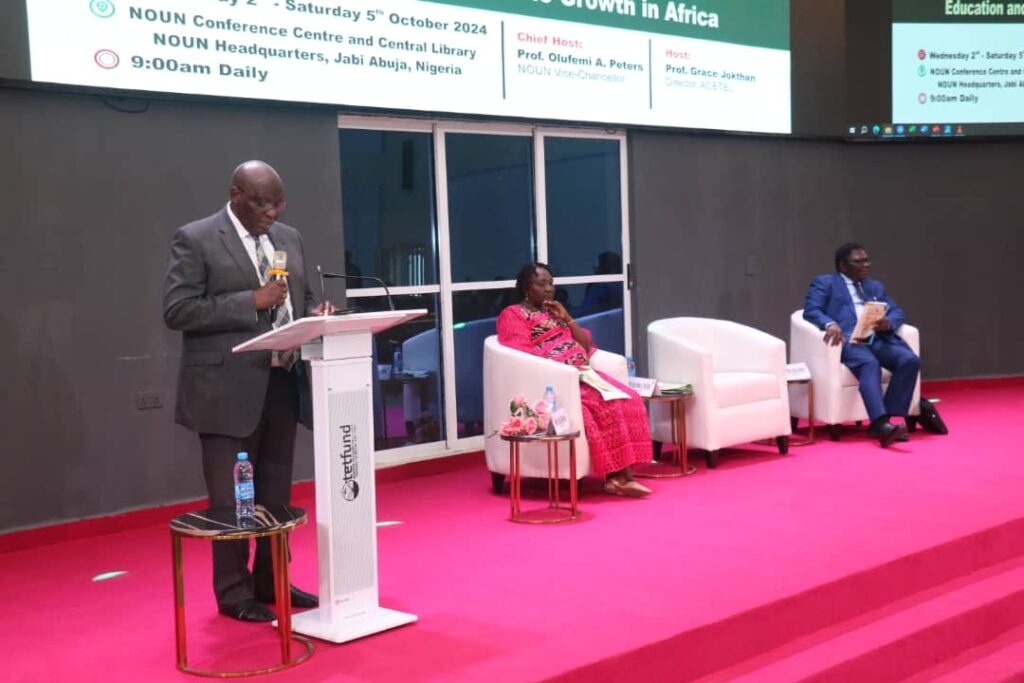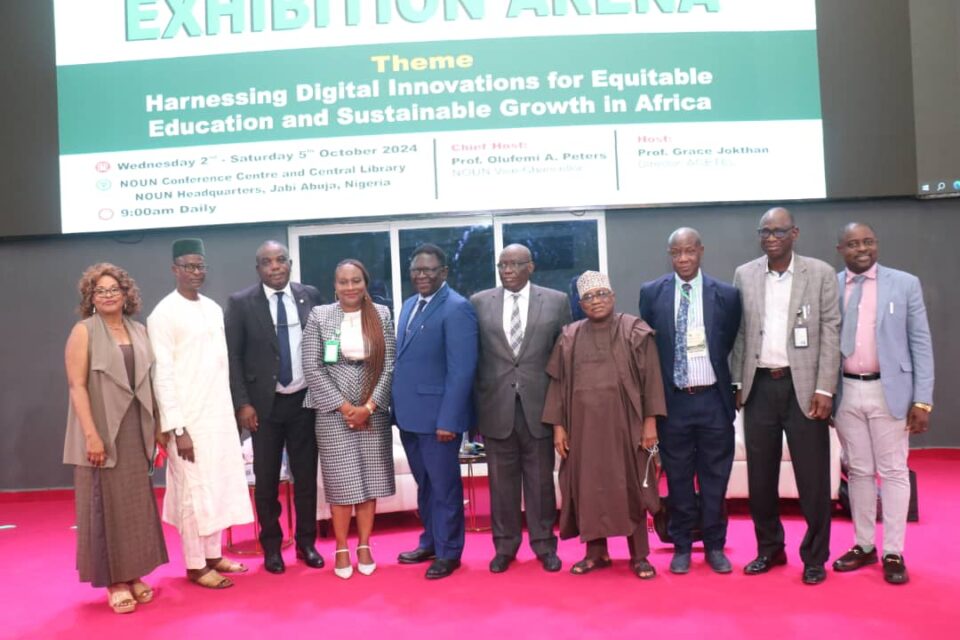By Felix Khanoba
The National Open University of Nigeria (NOUN) has expressed its readiness to deploy more advanced digital tools in the delivering of education through eLearning.
This was disclosed by the university’s Vice Chancellor, Professor Olufemi Peters, during the opening ceremony of the Africa Centre of Excellence on Technology Enhanced Learning (ACETEL) Exhibition and eLearning Conference, held at the university’s headquarters in Abuja on Thursday.
Speaking on the theme of the five-day event, ‘Harnessing Digital Innovations for Equitable Education and Sustainable Growth in Africa,’ Prof. Peters said the university would continue to leverage on technological advancement in its academic activities.
“I assure you that we will continue to lead in developing human capacity through emerging technologies, with a particular focus on innovative and ethical solutions for education.
” In recent years, the education landscape has undergone rapid changes, driven by technological advancements, global interconnectedness, and the evolving needs of learners.
” The COVID-19 pandemic, in particular, has underscored the urgency of embracing digital learning. What was once considered supplementary has now become essential for delivering
knowledge and skills.
” Today, e-learning is not just a temporary solution; it is a revolutionary pathway shaping the future of education,” he said.

While saying the conference provided an opportunity to reflect on how digital tools and solutions can transform teaching and learning experiences, the VC said the event also offered a platform to examine key themes such as personalized learning, artificial intelligence, digital equity, and inclusion in digital development.
He, however, emphasized the need to ensure quality and inclusivity in providing digital education amid the deployment of advanced digital tools.
“As providers of teaching and learning opportunities, we are at the intersection of tradition and innovation. It is our responsibility to ensure that e-learning solutions not only provide access but also maintain high standards of quality, inclusivity, and sustainability for now and the future.
“It is important to recognize that while technology is a powerful enabler, the vision, passion, and dedication of educators remain central to the learning process.
” As we adopt more advanced tools, we must not forget the human and cultural elements in education. Our roles as mentors, guides, and facilitators of knowledge continue to be crucial.
” Even with advancements in technology, we must invest in the continuous professional development of our students, equipping them with the skills to use these tools responsibly,” he said.
On her part, the Director of ACETEL, Professor Grace Jokthan, said over the past years the Centre has been committed to pushing the boundaries of what is possible in the education space by leveraging digital solutions to enhance learning, foster inclusivity, and create opportunities for growth across the African continent.
“At ACETEL, we recognize that technology has the power to democratize access to education, ensuring that the quality of education remains high, and that digital tools are used not just for convenience but for meaningful and transformative learning experiences,” she said.
Prof. Jokthan said with the support of the World Bank, NOUN, the Association of African Universities (AAU) and National Universities Commission (NUC), ACETEL has become a hub of innovation, fostering research, building capacity, and collaboration across borders.
“The Centre’s mission is to continue developing cutting-edge solutions that address the unique challenges of education in Africa,” she added.

In a keynote address on ‘eLearning in Africa :Strategies, Successes and Future Directions’, Professor Olusola Oyewole – Secretary General of AAU, said eLearning remains a major tool to address the problems of access and poor quality education in the continent.
” There are over 250 million out-of-school children in Africa, and a large percentage of this (number) are in Nigeria. This could have been addressed If there is opportunity for them to connect to eLearning.
” Many rural areas and remote areas in Africa have limited access to school and educational infrastructure,” he said.
While saying eLearning has resulted to various success stories in the area of research, access, among others, Prof Oyewole identified some of the barriers confronting the system to include infrastructure deficit, high cost of mobile data and several other issues.
He called on government to come up with a policy on regulatory framework to support eLearning and also ensure certificates obtained from the system are recognized as well as encourage collaboration and partnership in advancing eLearning across African universities.
The AUTHORITY reports that the event, which was organised in collaboration with the National Information and Communication Technology Development Agency(NITDA), the University’s Directorate of Research and Advancement(DRA) and Directorate of Entrepreneurship and General Studies (DE&GS), witnessed exhibition of groundbreaking innovations.

